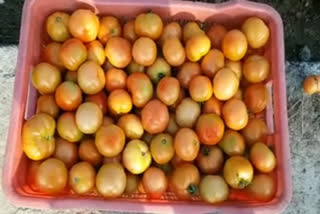Haldwani (Uttarakhand): Farmers of Kumaon have lost interest in growing tomato and have abandoned traditional farming. Farmers of Haldwani, Gaulapar, Chorgaliya and Kotabag are turning away from growing tomato which was once very popular in Pakistan. The production of tomato is declining now. The situation is so bad that a farmer who used to grow tomato on 250 bighas of land is now doing it on 2.5 bighas. Let us examine why the farmers have become disenchanted with tomato farming.
Tomato cultivation was once the main source of income for farmers of Haldwani and its neighbouring areas. This was because the weather and soil here were favourable for tomato farming and also the water was available with ease. It was convenient for the farmers to grow tomato and profitable as well because their crop used to get the remunerative price in the local market.
Production of tomato declining every year
However, farmers began to lose interest in tomato cultivation in the last few years. Its production has been declining. The government has been neglecting the interests of the tomato cultivators. There was a time when tomato from Kumaon region had great demand in Delhi as also in Pakistan. But now the tomato from here is sold in the restricted local market.
Diseases plaguing the tomato main worry
According to the Haldwani mandi sources, the production of tomato five years ago was two to three lakh quintals which has now come down to 50,000 quintals. Less rain and heavy fog cause much damage to the tomato crop. Moreover, any kind of disease afflicting the crop also affects the quality of the tomato.
Farmer Jagdish Chandra Joshi of Haldwani says that night-long fog wrecks havoc on the crop and the tomatoes turn yellow. The tomato grown in the valley of Kumaon was quite popular in Pakistan because of its sour taste. But this time, various types of diseases spoiled the crops. The export of tomato has stopped and it is now being sold only in the local market. Even the quality of tomato in local market has deteriorated.
